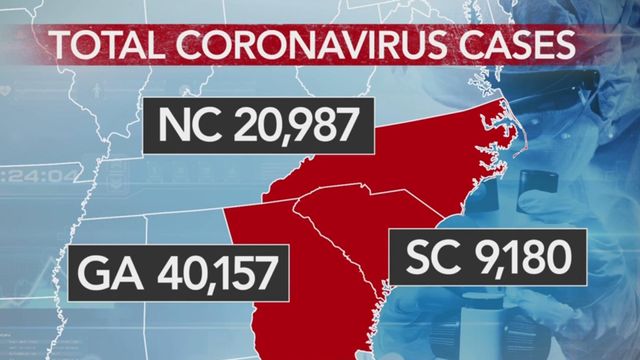Experts caution comparing virus outbreaks, reopening strategies between states
As North Carolina prepares for a scaled-back move on Friday into the second stage of a three-part plan to resume business and social activities during the coronavirus pandemic, other states are several steps ahead when it comes to returning to life as close to normal as possible.
Posted — UpdatedBut comparing the spread of the virus isn't as simple as putting states and their data side by side.
North Carolina has more than 20,000 infections, which ranks 35th per capita nationwide. Georgia, which is about the same size in terms of population, has twice as many cases, well over 40,000. South Carolina, with half the population of the other two states, has fewer than half the cases of North Carolina.
"You're not the first person who's looked at Georgia and said 'What?'" said Dr. William Schaffner, a professor in the Division of Infectious Diseases at Vanderbilt University. "We really kind of expected an explosion by now ... and people are really scratching our heads."
Aaron McKethan, assistant professor of population health sciences at the Duke University School of Medicine, called case counts "an artifact of who is tested and when."
"To make an apples-to-apples comparison to Georgia on reported COVID-19 cases, we would need to learn more about testing capacity and strategy in Georgia, whether either has changed, and see how it aligns with the same in North Carolina," McKethan said. "Among many other problems it is causing, COVID-19 is shining a bright light on weaknesses in our country’s public health data infrastructure."
Dr. Phillip Coule, chief medical officer at Augusta University Health in Georgia, acknowledged that testing priorities are different in each state and that outbreaks in places like nursing homes, prisons and meat-packing plants impact numbers.
"Those numbers absolutely and definitively skew those results," Coule said.
Beyond total numbers, however, trends matter.
"Despite more testing, we are seeing a downward trend in Georgia," Coule said, pointing to declining daily rolling averages of cases despite the state’s more aggressive reopening strategy.
"My belief is that is due to what’s called a 'summer burnout phenomenon,' and that is, as the weather gets warmer, it’s less hospitable to the virus," he said.
During the same time period from late April to mid-May, North Carolina case averages trended upwards, while daily cases in South Carolina, which also has been quicker to reopen businesses, have been lower and much more stable.
"While declining case counts can certainly be a good sign, these sorts of time trends – and differences in trends across states – should be interpreted with caution," said Kimberly Powers, an epidemiologist at the Gillings School of Global Public Health at the University of North Carolina at Chapel Hill. "Ideally, we want to be able to disentangle the effects of changes in testing coverage and changes in transmission intensity, but doing so in real time is challenging."
Cameron Wolfe, an infectious disease specialist at Duke, said the continued rise in infections in North Carolina "gives me great pause about reopening."
"If people think we can simply reopen and go back to life as it was in 2019, they are sorely mistaken," Wolfe said. "There will be a cost for that, and it will be measured in terms of infection."
All of the experts said people need to tread carefully into the sea of pandemic metrics because of questions about data collection, timing and even accuracy.
"You have to be very careful how you compare states, because this disease does not impact all populations evenly," Coule said.
Related Topics
• Credits
Copyright 2024 by Capitol Broadcasting Company. All rights reserved. This material may not be published, broadcast, rewritten or redistributed.






